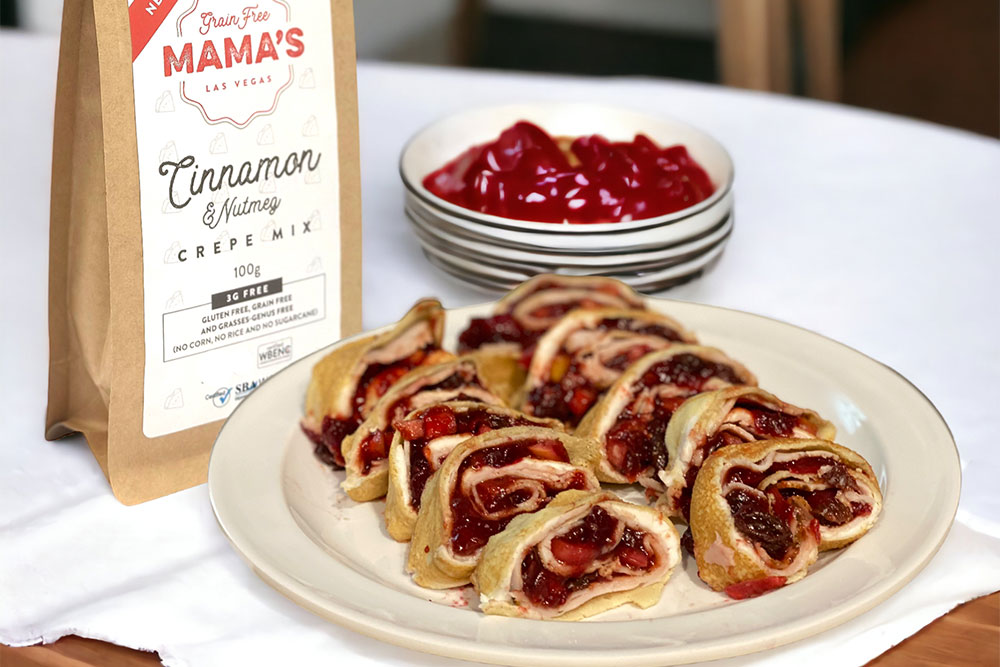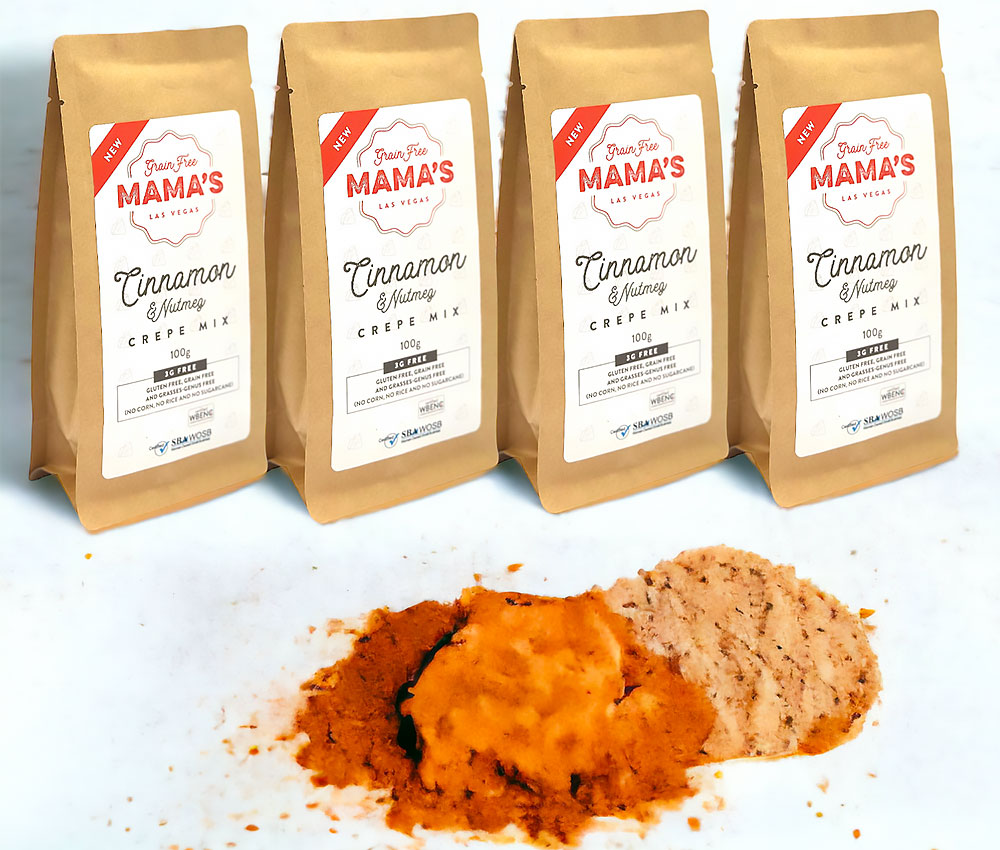Redefining Indulgence – A Healthier Approach to Holiday Treats

As the holiday season rolls in, so does the tempting array of confections and baked goods. It’s a time when indulging in these delights is not only accepted but encouraged. But at what cost? The concept of binging on sweets and pastries, often to the point of discomfort, poses a serious question: Can we truly consider it a treat if the consequences are sickness and fatigue?
Why do we culturally accept the concept of unhealthy binge eating during the holidays? I hear people every year plotting and calculating exactly how much they can eat of the foods that they know will make them sick before they are too sick to function. Huh??? All this in the name of celebrating? Doesn’t sound like celebrating to me, even though at the beginning of my own journey I did the very same thing. Becoming disenfranchised and disenchanted with the idea of anything less than healthy led to the founding of Grain Free Mama’s.
If you hear these conversations and substitute drugs for foods, wouldn’t we want to ‘plan an intervention’ to help the addicted people before they kill themselves? It also reminds me of the many flights home I was on with my children where we would hear conversations about how much money people were going to ‘drop’ on their vacation to Las Vegas. I live in the Vegas valley. It was always amazing to me to listen to those conversations, and a great reminder of the need for help for gambling addicts.
Yet we tolerate, and even encourage, similar dialogue with foods and as a culture don’t even question it? The answer lies in inspecting the historical phenomenon of holiday binging on foods. It is a practice with deep historical and cultural roots. Here are some key reasons:
- Harvest Celebrations: Historically, many cultures had feasts to celebrate the harvest. This was a time of abundance when fresh produce was plentiful, and people could eat more than usual. Over time, these harvest festivals evolved into the various holiday celebrations we see today.
- Religious Festivals: In many religions, feasts play a crucial role. For example, Christians have Christmas, where traditional meals are a central part of the celebration, and Muslims have Eid al-Fitr, a feast marking the end of fasting during Ramadan.
- Cultural Significance of Food: Food is often a central element of cultural identity and celebrations. Sharing a meal is a way to foster community and family bonds, which are especially emphasized during holidays.
- Feasting as a Status Symbol: In some historical contexts, the ability to provide a lavish meal was a sign of wealth and social status. Holidays became an opportunity to display this wealth by offering extensive menus and inviting many guests.
- Psychological Factors: Holidays can be a time of emotional significance, and people might binge as a way of coping with stress, seeking comfort, or indulging in nostalgia.
- Marketing and Commercialization: In contemporary times, holidays have become heavily commercialized, with food and drink industries marketing holiday-specific items that encourage overconsumption.
- Social Expectations: There’s often a social expectation to eat and enjoy food during holidays, which can lead to overindulgence as part of participating in the festivities.
- Abundance and Accessibility: In many modern societies, food is more accessible and abundant than in the past. Holidays can amplify this effect, making it easier to binge on foods that are otherwise considered treats.
Enough is enough! You can enjoy the holidays without sacrificing your health. We can walk alongside you with the products and resources (books and community) to break this pattern once and for all. You are not alone. You are strong enough, and capable enough, to take back control of your diet and your life starting today.
So, this leads me to my next question: Why is dieting in January so acceptable even though it is rarely successful? We also accept going from absolute food gorging to food deprivation without questioning our sanity or the toll it takes on our health and finances. Dieting (food prison) is often seen as a cultural norm for several reasons, even though it is commonly acknowledged that many dieting resolutions are not maintained long-term.
- New Year, New Start: The start of a new year symbolizes a fresh beginning, and many people are inclined to set personal improvement goals. Weight loss and fitness routinely top these lists as a way to “reset” after holiday indulgences.
- Cultural Pressure: There’s a societal emphasis on appearance and health, particularly after the holiday season, which often leads to a surge in diet-related resolutions.
- Commercial Influence: The diet and fitness industry capitalize on this trend by marketing “New Year, New You” campaigns, offering special deals on gym memberships, weight loss programs, and diet plans.
- Social Acceptance: It’s socially acceptable to talk about dieting and to pursue weight loss goals after the holidays, as many people are in the same situation and share similar goals.
- Visibility of Health Initiatives: January is also when many public health campaigns kick off, further encouraging people to consider their health and lifestyle choices.
- Reflection and Resolution: The end of the holiday season is a natural time for reflection on the past year and setting goals for the year ahead, and health goals are often at the forefront.
- Behavioral Tendencies: Humans tend to follow cyclical patterns, such as Monday as the diet start day or January as the diet start month, which can make dieting seem like a natural step.

Sustainable changes to diet and lifestyle are more likely to yield long-term success compared to drastic, short-term diets. The recognition of this pattern has also led to a growing emphasis on more holistic and sustainable approaches to health and wellness at the start of the new year.
Next question: Why do we accept the mindset that healthy eating is tasteless and bad and eating highly processed foods are treats? The mindset that healthy eating is tasteless and that highly processed foods are ‘treats’ is a complex issue shaped by cultural, psychological, and economic factors:
- Flavor and Instant Gratification: Highly processed foods are often engineered to be hyper-palatable, meaning they are designed to immediately satisfy with intense flavors and textures. Over time, we can lose our natural ability to ‘taste’ because of the dump of sugar, salt, and chemicals in the foods. This can make whole, natural foods, which may have subtler flavors, seem less appealing by comparison at first. We have broken taste buds.
- Cultural Conditioning: From a young age, many people are conditioned to view sweets and processed foods as rewards or treats. For instance, desserts are used to celebrate milestones, and fast food may be considered a special occasion meal.
- Marketing Influence: The food industry invests heavily in marketing processed foods as desirable, and they are really good at it. These products are often associated with fun, happiness, and social status through advertisements, which can overshadow the appeal of healthy foods. False advertising.
- Convenience and Accessibility: Processed foods are often more accessible and shelf-stable, making them a convenient option for many people. The effort required to prepare fresh, healthy meals can seem daunting by comparison. Grain Free Mama’s goal is to change this, having our products be available as healthier alternatives so that you, the consumer, can choose, instead of the grocery stores making your choices for you.
- Economic Factors: Sometimes, healthy foods, particularly organic or specialty items, are more expensive than processed alternatives. This price difference can make processed foods more attractive to those with budget constraints. Yet, you must ask yourself, is saving a little now but then having to spend a large portion of your retirement resources on healthcare a good use of funds??? Is poor health worth the price?
- Lack of Exposure: If individuals are not exposed to a variety of healthy foods prepared in flavorful ways, they may develop a bias that healthy eating is inherently tasteless. Not true. Want to learn more? Get your copies of Food Breakthrough Book and Cookbook.
- Time and Knowledge: Preparing tasty and healthy meals can require cooking knowledge and time that not everyone has. This can create a reliance on processed foods that are quick and easy to prepare or consume. Check out the cookbook. There are many quick and easy to prepare choices that are good for you.
- Habit and Comfort: Eating habits are hard to break, especially when they are associated with comfort or nostalgia. Processed foods often fall into this category. However, it is not impossible at all. That’s what the Food Breakthrough book and A Place At The Table community are for, to give you the support to easily make healthy changes. Give yourself a gift this year. You are only one decision away from a whole new you.
- Misinformation: There’s a lot of conflicting information about what constitutes healthy eating, which can lead to confusion and a return to familiar processed foods. Sadly, this is so true. That is why we created A Place At The Table as a collaborative community to learn, share information, and grow together.

Changing this mindset involves education on the benefits of healthy eating, how to prepare healthy foods in flavorful ways, and addressing the economic and accessibility issues that make processed foods more appealing. There’s also a growing food movement that focuses on the pleasure of cooking and the taste benefits of fresh, whole foods, which may help shift this perspective.
As Founder of Grain Free Mama’s, my vision is to help people to find hope, and deliciously eat their way back to good health and food freedom. I am determined to provide not just products, but also the educational resources and the community to help people live their best lives. We make our food choices based upon the level of our nutritional knowledge. Want to make changes? Learn, grow, and watch your level of health soar.
Grain Free Mama’s Crepe and Pizza Crust Mixes were created naturally utilizing the highest quality, low inflammatory ingredients for people who ‘have to’ or ‘choose to’ eat delicious foods that are as tasty as they are good for you. All our baking mixes are edible grass ingredient free (no flours of gluten or non-gluten grains, no corn, no rice, and no cane sugar), dairy free, soy free, botanical nut free and free of anything artificial. We are on a mission to provide the products and educational resources to help you to change the way you look at food, so that you can eat guilt free, feel the best, and can live life to the full.
Our philosophy? I believe that we can have delicious baked goods that are good for us at the same time. Everyone wants to eat foods that will nourish our bodies, NOT foods that will eat us alive from the inside out after we eat them. Grain Free Mama’s baking mixes give nourishment. This is a big part of sustaining our planet. First, we sustain the people, then as healthy people we will take better care of our planet home. That’s REAL SUSTAINABILITY. Grain Free Mama’s Sustainable Development Goal is #2: ZERO HUNGER. Our belief is that this will happen when all people, regardless of income, have access to health-giving foods. SUSTAINED PEOPLE WILL SUSTAIN THE PLANET.

In conclusion, maybe it’s time to carefully re-consider our mindset about celebrating with foods this holiday season? Save yourself the heartburn, exhaustion, and finances (the money you will spend on a diet that probably won’t even work). I think you will find that putting a little more resources towards healthier options is not only affordable, but actually much less expensive in the long run.
Watch for next week’s article: Give yourself and Your Family the Gift of Health – Practical Tips for a Healthier Holiday.

Written by Margie Traxler
Grain Free Mama’s is a FoodTech Consumer Product Goods company. We make gluten/grain/sugar free (Edible Grasses Free), dairy free and botanical nut free baking mixes that put the simple back into simply good for you. We also have educational resources to help you on your healthy eating journey. Margie, the Founder/CEO, received her B.S. in Biology from Portland State University. She has 22 years of experience as a successful Restaurant owner. She lives and operates her business in Henderson, Nevada.





